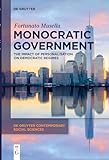Monocratic Government : The Impact of Personalisation on Democratic Regimes / Fortunato Musella.
Material type: TextSeries: De Gruyter Contemporary Social Sciences ; 8Publisher: Berlin ; Boston : De Gruyter, [2022]Copyright date: ©2022Description: 1 online resource (VI, 156 p.)Content type:
TextSeries: De Gruyter Contemporary Social Sciences ; 8Publisher: Berlin ; Boston : De Gruyter, [2022]Copyright date: ©2022Description: 1 online resource (VI, 156 p.)Content type: - 9783110721386
- 9783110721836
- 9783110721720
- online - DeGruyter
- Issued also in print.
| Item type | Current library | Call number | URL | Status | Notes | Barcode | |
|---|---|---|---|---|---|---|---|
 eBook
eBook
|
Biblioteca "Angelicum" Pont. Univ. S.Tommaso d'Aquino Nuvola online | online - DeGruyter (Browse shelf(Opens below)) | Online access | Not for loan (Accesso limitato) | Accesso per gli utenti autorizzati / Access for authorized users | (dgr)9783110721720 |
Frontmatter -- Contents -- 1 Introduction. Political leaders at times of the personalisation of the masses -- 2 Personal governments -- 3 Fragmented Electorates and Parliaments -- 4 The expansion of governmental decrees -- 5 Digital presidents: political engagement and decision -- 6 Heads of government from primacy to emergency -- 7 Combining demos and kratos: a mission impossible for the future of democracy? -- Appendix Monocratic Government Dataset: Personalisation of Leaders and Masses in Democracy -- Bibliography -- Index
restricted access online access with authorization star
http://purl.org/coar/access_right/c_16ec
Personalisation is the most relevant political phenomenon of our time. After the decline of structural and ideological foundations of Western democracies, a radical shift from collective to individual actors and institutions has occurred in several political systems. On the one hand, political leaders have gained centrality on the democratic scene as a consequence of both a more direct, sometimes plebiscitary, relationship with citizens, and a more direct control of the executive administration. On the other hand, a process of fragmentation occurs at the mass level, where electoral volatility has strongly increased and the spread of social media enables each citizen to express their convictions in the self-referential autonomy of the digital networks. Monocratic Government: The Impact of Personalisation on Democratic Regimes analyses the consequences of personalisation of political leaders on democratic government by asking whether it is possible to keep together demos and kratos in a post-particratic context. It explores topics such as governmental decrees, Trump-governance, and includes an analysis of the coronavirus outbreak. Offering comparative insights and exploring how political leaders govern in the United States, France, Germany, Italy, and Hungary, this volume brings into focus the study of political personalisation in relation to some of the key trends – and crises – in modern politics.
Issued also in print.
Mode of access: Internet via World Wide Web.
In English.
Description based on online resource; title from PDF title page (publisher's Web site, viewed 02. Mai 2023)


